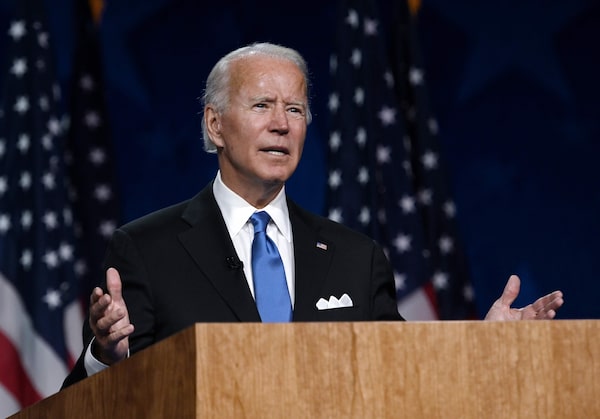
Former vice-president and Democratic presidential nominee Joe Biden accepts the Democratic Party nomination for US president during the last day of the Democratic National Convention.OLIVIER DOULIERY/AFP/Getty Images
Joe Biden vowed to end the U.S.‘s “season of darkness” as he formally accepted the Democratic nomination for president, casting himself as a steady hand who can steer his country out of its numerous crises and an empathetic conciliator who can bridge its divides.
In a passionate, low-key speech resembling a fireside chat, Mr. Biden accused President Donald Trump of having “cloaked America in darkness for far too long,” sowing “anger” at home and “cozying up to dictators” abroad.
And he pledged to tackle the “perfect storm” of four major problems plaguing the U.S.: The COVID-19 pandemic, the resulting economic crisis, systemic racism and climate change.
“This is our moment to make hope and history rhyme … for love is more powerful than hate, hope is more powerful than fear, and light is more powerful than dark,” the 77-year-old former vice-president said. “May history be able to say that the end of this chapter of American darkness began here tonight as love and hope and light join in the battle for the soul of the nation.”
The address was the finale of a four-day, unprecedented Democratic National Convention, in which speakers beamed in from hundreds of locations across the United States after the pandemic scuttled the originally planned in-person gathering in Milwaukee.
Mr. Biden delivered his acceptance speech at a convention centre near his home in Wilmington, Del., the hall empty save for a handful of journalists sitting six feet apart from one another.
Five key takeaways from the Democratic National Convention’s third night
And he frequently assailed Mr. Trump for his handling of COVID-19, in which the U.S. leads the world in cases and deaths.
“It’s not this bad in Canada, or Europe, or Japan, or almost anywhere else in the world,” Mr. Biden said, as he laid out his own plan, which includes ramping up testing, distributing more personal protective equipment and bringing in a national requirement that everyone wear a mask.
Mr. Biden accepted the nomination as Mr. Trump faced another day of bad news. His former chief strategist Steve Bannon was indicted on fraud charges for allegedly swindling donors out of US$1-million that was supposed to be spent on privately building parts of Mr. Trump’s promised wall on the Mexican border. And a judge ruled that the President must release his tax returns. Mr. Trump has denied knowledge of Mr. Bannon’s alleged scheme and plans to appeal the ruling on his taxes.
The night was Mr. Biden’s opportunity to unite a broad and sometimes fractious voting coalition ranging from socialists to soft conservatives around him. He gave some succor to the left, promising to make rich people pay more in taxes, and vowing to choose “fairness over privilege.”
In Mr. Biden’s hometown of Scranton, Pennsylvania, supporters contrasted his upbringing – in a modest clapboard house in this blue-collar city of 80,000 – with Mr. Trump’s lifelong wealth.
“I’ve lived here my whole life, so it feels like he’s a neighbour,” said Janet Shaw, 67, a retired teacher who runs a business helping senior citizens with housekeeping and lawn work. “He wasn’t born into a wealthy family, he was born into a regular, working-class family. He can relate to people.”
And she praised his internationalism, which she hoped would restore American leadership after Mr. Trump’s isolationism.
“He’s going to be able to bring up our standing in the world. He’s going to respect other nations and work with them. Other countries respect him,” she said.
Mr. Trump, for his part, tried to steal Mr. Biden’s thunder with a visit to a kitchen-renovation business near Scranton a few hours before the Democratic nominee’s speech. Mr. Trump doubled down on his nationalistic rhetoric, accusing international deals from the North American free-trade agreement to the Paris climate accord of hurting this industrial corner of the country.
“Biden supported every single globalist attack on Pennsylvania workers,” Mr. Trump said. “He’s your worst nightmare.”
“Joe Biden has spent five decades in Washington betraying the people of Scranton,” Mr. Trump said. “He is your worst nightmare.”
Mr. Trump’s argument plays well to people such as Martin Barrett, 59, of nearby Kingston, Pa. Mr. Barrett, who worked in a glass factory that closed down in 2004 amid competition from overseas manufacturers, blames free-trade deals for eroding the area’s manufacturing sector. Mr. Barrett voted for Mr. Trump in 2016 and plans to do so again.
“They call him the blue-collar billionaire: He knows how to talk to the working class of this country. He relates,” Mr. Barrett said.
Mr. Biden devoted much of his speech to showing his own relatability. He referenced the tragedies that have marked his life – choking up when he spoke the name of his son, Beau, who died of cancer in 2015 – and speaking directly to people who have lost loved ones during the pandemic.
And the evening’s other speakers contrasted a vision of a more inclusive America with the tumult and fighting of Mr. Trump’s presidency.
“Every American must now decide. Can America be a place where faith is about healing and not exclusion? Can we become a country that lives up to the truth that Black Lives Matter? Will we handle questions of science by turning to scientists and doctors?” said former South Bend, Ind., mayor Pete Buttigieg, one of Mr. Biden’s erstwhile primary opponents.
Atlanta Mayor Keisha Lance Bottoms made an appeal to young and Black voters who came to the polls for Barack Obama in 2008 and 2012, but sat out the previous election.
“People often think they can’t make a difference like our civil rights icons, but every person in the movement mattered – those who made the sandwiches, swept the church floors, stuffed the envelopes,” she said.
Outside Mr. Trump’s speech in Scranton, Melissa Hady said she trusted Mr. Biden to solve the country’s problems, starting with the pandemic. A Scranton native who works as a school counsellor in South Carolina, the 46-year-old came home for a visit in June and chose to stay through the summer after COVID-19 surged in the south.
She was also counting on him to heal the United States’ wounds.
“I think Joe Biden is a good man and he’s going to bring the country together,” she said. “We need unification and peace.”
Our Morning Update and Evening Update newsletters are written by Globe editors, giving you a concise summary of the day’s most important headlines. Sign up today.
 Adrian Morrow
Adrian Morrow